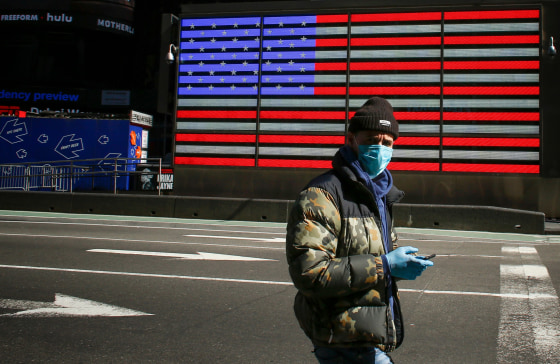The coronavirus outbreak has spurred a rush on related website domain names — such as coronavirus.com — and stirred investors looking to profit off the newest global health crisis.
That has led some domain registrars and marketplaces to take action to limit profiteering off coronavirus-related terms.
The number of coronavirus-related domains has grown to more than 68,000 this year, many of which are tied to spammers and cybercriminals, according to DomainTools, a cyber-intelligence company that tracks such domains.
“The volume is really unprecedented,” said Sean McNee, director of research and development at DomainTools. “The number of bad domains have grown in exponential volumes, similar to the number of cases of the disease worldwide.”
Website domains are valuable property. Some popular domains such as Voice.com have sold for $30 million. The domain name sales industry is estimated to have generated $6.4 billion in revenue in 2019, according to market researcher IBISWorld.
With millions of people around the world staying home and seeking information, supplies and treatments related to the coronavirus, domains associated with it and the disease it causes, COVID-19, have become a hot item on domain marketplaces.
While the market has been oversaturated with registrations, most serious domain investors steer clear of pandemic-related domain names, said Elliot Silver, a domain investor himself and the publisher of a popular domain investments blog who has analyzed public sales of outbreak-related domains.
“There always seem to be people buying domain names related to tragedies,” Silver said. “But in general, you don't really see many of them trade for anything. To me, it's a waste of time and money. And it just seems like there's potential for too much negativity.”
But the coronavirus outbreak has proved too lucrative an opportunity for many people.
Jon Schultz is a well-known and often-criticized domain investor who sold Ebola.com in 2014 and is now looking to unload coronavirus.org along with 10 or 15 other coronavirus domains.
“I was trying to buy coronavirus.com but I wasn’t successful,” Schultz said.
That domain name, more attractive with .com than .org, is reportedly owned by the domain registrar GoDaddy, which acquired it as part of a deal unrelated to the current outbreak and which currently forward visitors to the World Health Organization’s website.
Schultz suspected that the current outbreak might be a coronavirus before it was officially named and bought coronavirus.org for a small registration fee — about $9, he said.
Schultz was raked through the coals by the national press in 2014, when he sold Ebola.com. “It wasn’t fun,” Schultz said, to be called the “merchant of disease,” by The Washington Post, or an “opportunistic piece of human garbage,” by Gizmodo, “but we did sell the domain a week later for $200,000.”
Schultz declined to say how much he’s hoping to get for coronavirus.org.
“A domain is only worth what someone is willing to pay for it,” he said.
While it’s still his, Schultz is using the site to promote unproven treatments as potential cures, a tactic that he says could help him sell the site.
“People have this idea that you shouldn't profit on the tragedy,” Schultz said. “I think that's kind of a superstition. And it fails to recognize that life is profiting off tragedy.”
As well as taking steps to limit the sale of coronavirus domains, individual marketplaces are supporting organizations and agencies battling the pandemic.
One of the largest independent domain marketplaces, Dan.com, announced Thursday it would remove coronavirus-related domain names and no longer allow sellers to list them for sale, citing the “astronomical” prices fixed to the domains, gouging that DAN considers “unethical and unacceptable.”
A spokesperson for DAN said the company had removed more than 1,400 coronavirus and COVID-19-related domains by Thursday afternoon. DAN encouraged clients who own coronavirus domains to donate them to charities, government agencies or nonprofits.
The decision followed a similar announcement from the domain registrar Namecheap, which alerted customers on Wednesday that it would no longer accept new coronavirus-related domains. In an email, Namecheap said the new restrictions were meant to curb those who would “take advantage of crisis situations by carrying out acts of fraud.”
GoDaddy, the world's largest domain registrar, is also restricting the resale of coronavirus and covid domain names.
Many domains that have previously been registered and changed hands in recent years are pointing people toward misinformation and products that make questionable claims.
Until last week, a notably valuable domain, covid19.com, redirected to germproof.com, a site that sells chelated silver products, with claims that they can protect users from germs and viruses, alongside other supplements that claim to “detox” the body, build up the immune system and stop viruses.
“Throw away your hand sanitizers!” the website reads.
The site’s owner, a self-described serial entrepreneur, Todd Reum, said that his product is supported by a highly regarded chemist, lab-tested and approved by the Food and Drug Administration. Reum declined to offer supporting evidence, citing proprietary secrets and competition.
As for covid19.com, the website’s owner is hidden behind a private registration. It was blacklisted from Google’s search results in February and currently redirects to the WHO’s coronavirus support page. Reum denied owning the site and declined to discuss the site’s owner, citing privacy concerns.
Reum was quick to note the other domains that redirect to his germproof website. They include pandemic.com and facemasks.com, which Schultz said he sold earlier this year.
Survive.com, survivor.com and sue.com also redirect to germproof’s site, “in case someone might want to sue over covid19 and then see our product,” Reum said.
“All of these domains are for sale, by the way,” he added.


